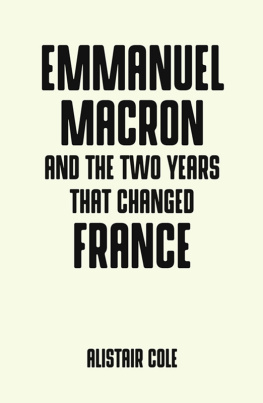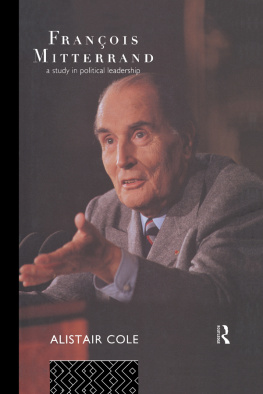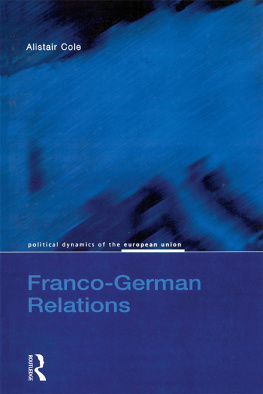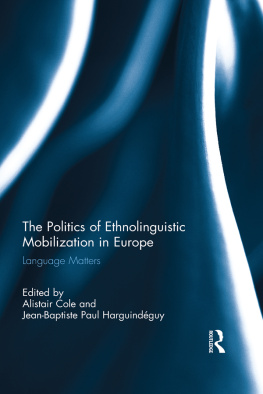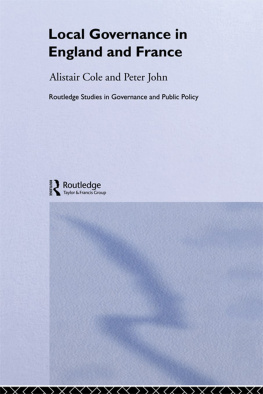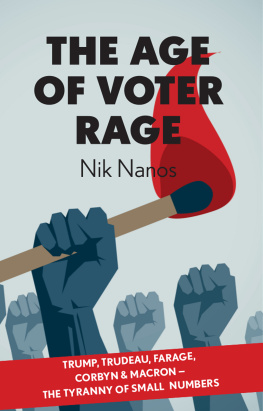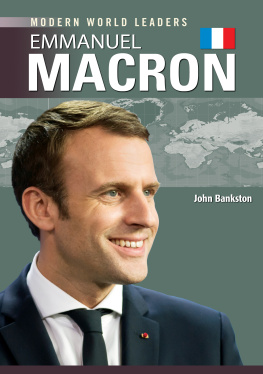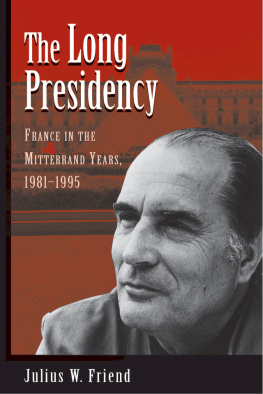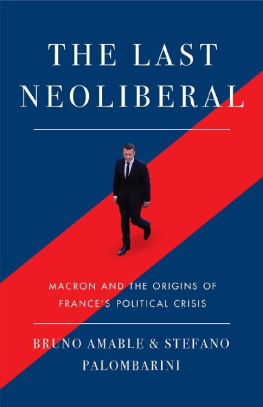Emmanuel Macron and the two years that changed France
POCKET POLITICS
SERIES EDITOR:BILLJONES
Pocket politics presents short, pithy summaries of complex topics on socio-political issues both in Britain and overseas. Academically sound, accessible and aimed at the interested general reader, the series will address a subject range including political ideas, economics, society, the machinery of government and international issues. Unusually, perhaps, authors are encouraged, should they choose, to offer their own conclusions rather than strive for mere academic objectivity. The series will provide stimulating intellectual access to the problems of the modern world in a user-friendly format.
Previously published
The Trump revoltEdward Ashbee
The politics of everyday ChinaNeil Collins and David OBrien
LobbyingWyn Grant
Power in modern RussiaAndrew Monaghan
Reform of the House of LordsPhilip Norton
Government by referendumMatt Qvortrup
Transatlantic traumasStanley R. Sloan
Emmanuel Macron and the two years that changed France
Alistair Cole
Manchester University Press
Copyright Alistair Cole 2019
The right of Alistair Cole to be identified as the author of this work has been asserted by him in accordance with the Copyright, Designs and Patents Act 1988.
Published by Manchester University Press
Altrincham Street, Manchester M1 7JA
www.manchesteruniversitypress.co.uk
British Library Cataloguing-in-Publication Data
A catalogue record for this book is available from the British Library
ISBN978 1 5261 4049 4paperback
First published 2019
The publisher has no responsibility for the persistence or accuracy of URLs for any external or third-party internet websites referred to in this book, and does not guarantee that any content on such websites is, or will remain, accurate or appropriate.
Typeset
by Toppan Best-set Premedia Limited
Are the French ungovernable? Is France destined to move from one crisis to another? Are the social and cultural divisions in the country so deep that compromise politics and good governance are merely aspirational concepts? Recent French presidents could be forgiven for thinking so. Since the introduction of the direct election of the president in 1962, successive leaders have been elected with great fanfare and on the back of many promises, raising expectations to levels that are almost bound to lead to collective, popular disappointment. And they have. Even Charles de Gaulle, who is universally recognised as a great leader, failed to match those expectations, with the regime nearly collapsing in 1968 and him resigning somewhat ignominiously in 1969. More recently, both Nicolas Sarkozy and Franois Hollande failed to be re-elected, the latter not even presenting himself to the voters, so unpopular was he. If T. S. Eliot had been writing about France, truly he would have said that French presidents were hollow men who went out not with a bang but with a whimper.
Will Emmanuel Macron change that? Certainly, he is not cast from the same mould as most recent French presidential incumbents. He is not a long-time party apparatchik. He is not an experienced political operative. He is not the representative of a distinct ideological tradition. Instead, he is largely an outsider in terms of the political class. His supporters in parliament have a personal rather than a partisan loyalty. He is also willing to consider new ideas that could radically restructure French society, perhaps even making the country governable. For these reasons and others, he offers the prospect of genuine change. Will he be able to bring it about, though? That is the question with which he, his administration, the French public and indeed the wider European populace are currently wrestling. Some say that Macron is playing a long game, being willing to court unpopularity in the short term for the sake of passing significant reforms that will benefit him in time for the 2022 presidential election. Whether or not he will succeed, only time will tell.
In this book, Alistair Cole reflects on the French presidency, the 2017 presidential election and the early period of the Macron presidency. The content builds on work that was first published on the Presidential Power blog (www.presidential-power.com). The blog comprises over thirty regular contributors, who comment on presidential politics in countries all around the world. There are daily posts aimed at the country specialist, the informed reader and merely interested observers alike. Contributors place presidential politics in perspective, reflecting on events and providing expert commentary. Alistair has been the blog's regular contributor on France. He has brought the intricacies of French politics to a wide audience. I am delighted that he has now had the opportunity expand on the posts and shed even more light on the seemingly impenetrable world of French politics. I would encourage readers to continue to follow his posts on the blog, and I am more than happy to recommend this book.
Robert Elgie, September 2018
This book results from close observation of the changing political landscape in France from 2014 onwards, as I was invited first as Senior Researcher to the Lyon Institute of Advanced Studies (2014) and latterly in my capacity as Professor of Comparative Politics at Lyon's Institute of Political Studies (Sciences Po Lyon) from 2015. It picked up pace and intensity as the 2017 presidential election campaign began in earnest and Emmanuel Macron was elected as president. The analysis concludes in May 2018, on the first anniversary of Macron's election as President.
) undermined, by association, the claim to ethical integrity and cast unwelcome light on the operation of Macron's Elyse. After a highly mediatised summer break peppered with minor controversies that are germane to the peoplisation of the presidential office, such as Brigitte Macron's ordering of a new swimming pool at the Breganon residence things began to disconnect in earnest. During the second half of 2018, Macron's authority was undermined by his hesitations (over whether to collect income tax at source), resignations (first, of the popular environment minister Nicolas Hulot, and then of the interior minister Grard Collomb) and diminishing popularity. And it was then shaken to its foundation by the sudden rise of the yellow vest movement and the violent riots of NovemberDecember 2018.
on diesel, to which were added recent pension tax and cigarette duty increases. The early phase of the gilets jaunes was generally good-natured. It centred on demonstrating on the innumerable roundabouts of small-town and rural France. As so often in France's past, however, the movement took on a new dimension once it had descended on Paris, in a series of four increasingly violent protests in November and December 2018. A mainly peaceful movement on 17 November was followed by three extremely violent protests on 24 November, 1 December and 8 December, before the movement showed signs of withering by mid-December 2018. The gilets jaunes underwent a process of radicalisation, being joined by groups of anarchist and extreme-right protesters, who caused unprecedented damage on the Champs Elyses (24 November) and surrounding streets (1 December, 8 December). These were groups that had already infiltrated demonstrations against the El Khomri labour law under President Hollande. The symbolism of the yellow vests made it easier for agitators to infiltrate the ranks of the protesters.

